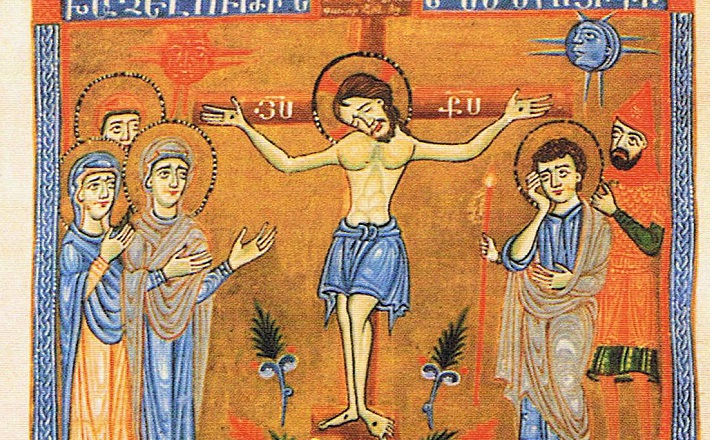Commentary on Psalm 31:9-16
Today marks the beginning of Holy Week, a time in the Christian calendar when we journey with Christ to the cross, remembering Christ’s suffering for our sake as well as our own dying with Christ in the waters of baptism.
Holy week can be a time for reorienting ourselves again to the ways of the kingdom of God where suffering rather than a sword brings freedom and life, where the humbled are exalted, where the last become first.
While the temptation this week may be to focus almost exclusively on the Gospel or Epistle selections, the Holy Week psalms can be a valuable resource for reflecting more deeply on the significance of Christ’s passion for our daily life with God. Through the psalms, Christ joins his voice with ours and we with his, raging against the darkness of this world, naming the daring and unwelcome truth that things are not the way they are supposed to be, while clinging to the audacious hope that in Christ, God is making all things new. Through the psalms, we voice our conviction that the light shines in the darkness, and the darkness did not overcome it (John 1:5).
As a psalm of lament, Psalm 31 takes us to the heart of the passion narrative. The nature of the psalmist’s distress is described in broad terms using images of physical illness, isolation, mental anguish, and persecution. The cyclical nature of the psalm, moving as it does from lament to trust (vv. 1-8) to lament and trust again (vv. 9-13), gives the impression of sorrow upon sorrow, or a “life spent with sorrow,” which has left the psalmist at wits’ end, pushing him to the limit of human forbearance. This life of hardship threatens to undo the psalmist, his humanity, dignity, and spirit battered and bruised. “I have passed out of my mind like one who is dead; I have become like a broken vessel,” the psalmist moans (v.12).
This, however, is not the whole story. The psalmist knows that there is one who has both the power and the will to deliver him from his suffering. Casting himself upon the Lord, he cries, “Be gracious to me, O Lord, for I am in distress.” It is an act of resolve to trust in God, God’s goodness and God’s covenant loyalty, when it seems like God has abandoned him. “But I trust in you, O Lord; I say, “You are my God (v. 14).” Allusions to God’s covenant with Israel are latent throughout this section of the psalm. Evoking the language of the priestly blessing of Numbers 6:24-26, the psalmist prays, “let your face shine upon your servant (v. 16a),” appealing to the God who established Israel as his people so long ago, and promised to bless and keep them. He now asks that God would make good on this promise — that God would shine his face upon him. While not part of the lectionary reading, the psalm closes with shouts of praise that God has indeed responded to the psalmist’s plea and has manifested his covenant loyalty again in showing him steadfast love.
In the context of the passion of Christ, we are invited to read this psalm as a reflection of Christ’s own suffering. Certainly the psalmist’s complaint coincides well with the description of the suffering servant in Isaiah 50:4-9. Additionally, the gospel of Luke records Jesus praying the words of v. 5 in the final moments before his death, “Father, into your hands I commend my spirit (Luke 23:46),” suggesting that Jesus himself identified with the psalmist’s sorrow.
This association of the psalmist’s suffering with that of Christ provides a number of fruitful avenues for reflection. First, in the act of praying these words, Christ quite explicitly takes on the suffering and hardship of the psalmist and by extension, all who would pray this lament. The implication here is profound. While it is common in North America to associate God’s presence with material blessing, implicitly identifying suffering and hardship with God’s absence, Luke and the New Testament writers clearly reject this theology. Instead, the association of Jesus’ suffering with the psalmist’s suggests that where there are cries of lament, where there is pain, where there is hardship, that is where Jesus is. Jesus took upon himself the pain of world, entering into the darkest places of this world to bring redemption.
Second, while Christ joins us in our suffering, taking our pain upon himself, his suffering is markedly different from our own. The lectionary’s careful selection of verses from this psalm (Psalm 31:9-16) signals this difference well. The psalmist, out of his pain and distress, goes on to pray in v. 17 for shame and death to come upon his enemies. Jesus, however, did not. “Forgive them,” Jesus cried, “for they do not know what they are doing (Luke 23:34).” By contrast, Jesus absorbed the evil of his enemies and returned their ill will with love. In this sense, Christ’s suffering and death is unique because in the mystery of God’s redemptive plan, the cross puts an end to sin and evil, making possible a future world in which there will be no more suffering or pain.
As such, for all of us praying this prayer today, Jesus’ death on the cross is God’s answer to our lament. Yes, we live in a troubled world plagued by fear and insecurity, violence, racism, homelessness, disease, and senseless death. But we also live in a world in which Christ really died on a cross so that all could be made new. As we wait for that day when the fullness of the kingdom of God will be realized, the Scriptures invite us to join with the psalmist in saying, “I trust in you, for you are my God. Save us in your steadfast love.”


March 20, 2016